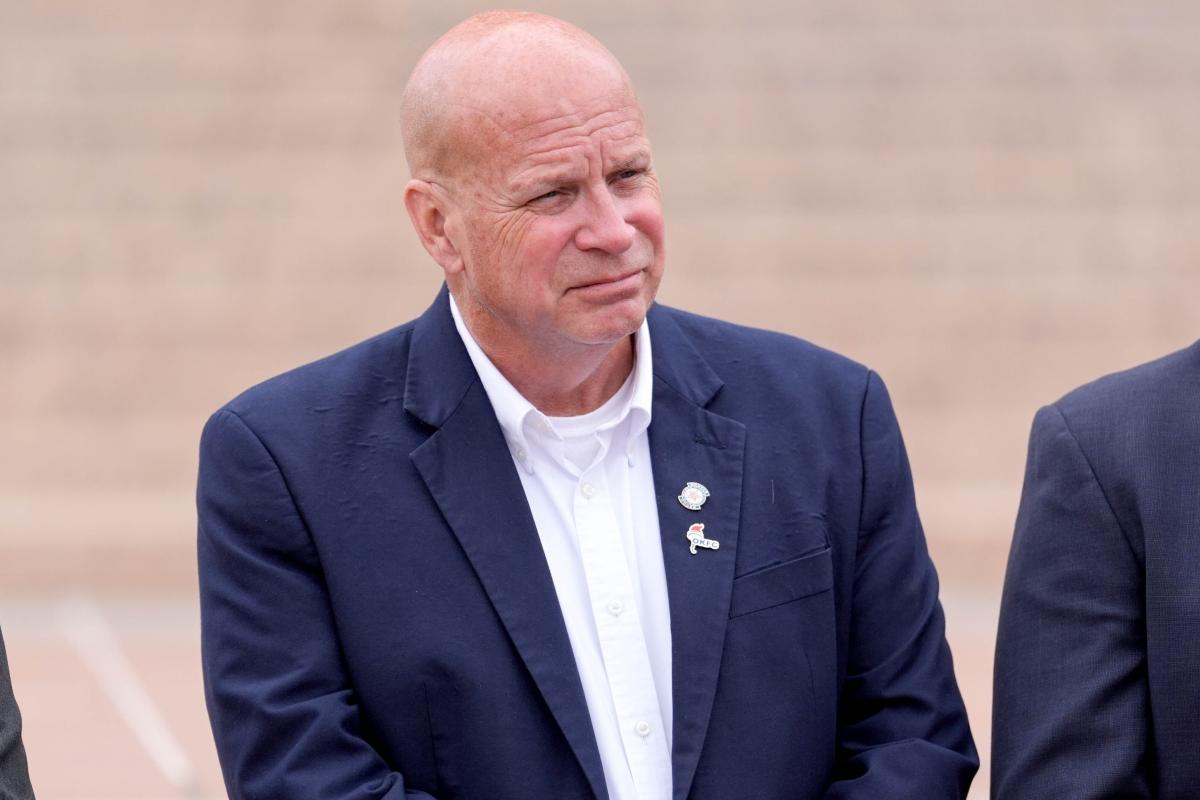
A bill to put the Ten Commandments into public school classrooms has been revived for another year.
State Rep. Jim Olsen, R-Roland, pre-filed the legislation this week and it’s an exact copy of the previous legislation entered in the 2024 session. The only change is the effective date of the law and start of the school year, 2025-2026. A senate author has not signed on yet, but Sen. David Bullard, R-Durant, signed onto last year’s bill.
Last year, the bill made it to the Appropriations and Budget Education Subcommittee, but wasn’t picked up on the agenda and was effectively killed by former committee chair Rep. Mark McBride, who was term limited. McBride has been a staunch critic of mixing religion into public schools.
Advertisement
Advertisement
“Not every kid in that classroom is the same faith as I am,” McBride said last year. “All of these people keep talking about the founders. Our founders (wrote) the First Amendment of the Constitution. It basically forbids Congress from choosing one religion over another.”
Olsen said the purpose is to give young people a more accurate and thorough presentation of the nation’s history. He said displaying the Ten Commandments is one way to accurately represent the spiritual heritage of the Founding Fathers, but most of the Christian foundations of the U.S. have faded or been wiped away.
“[They are] widely regarded and leaned upon by the founders and most of the leaders of early America, so I wanted them to have that accurate history. That this is how they relied upon things,” he told The Oklahoman.
Along with the Ten Commandments, Olsen said the Bible should also be in school because it is a “certain, definite part of our history as a nation.”
Advertisement
Advertisement
“We’ve always been a Christian nation with freedom of religion for all,” he said. “Any student is welcome to look at that history and say, ‘Hey, in my opinion, we would have been, rather than a biblical foundation, we would have been better off with something else.’ Everybody else, of course, is free to make that judgment.”
Olsen added that the U.S.’s legal structure and cultural background had strong biblical foundations. He gave an example of laws about stealing.
“Well, I can’t do that because ‘thou shalt not steal,’ which comes from the Bible and which made it into our statutes,” he said. “That’s good for everybody, whatever their personal religious belief might be.”
The bill does not require an allocation of taxpayer money to pay for the posters but instead relies on private donations. Olsen said he believed groups would be donate copies, and that taxpayer money wouldn’t have to be used to supply schools with the copies.
Advertisement
Advertisement
More in U.S.
However, with new legislators sworn in, some arguably more conservative than the ones they replaced, and facing down a new legislative session that is likely to include many conversations about religion in public schools and separation of church and state, Olsen hopes the bill will have a bigger chance at advancing through both chambers to the governor’s desk.
Olsen didn’t know if there would be enough influence to pass the bill this year, but he said he hoped new leadership and freshman legislators would be more receptive.
“Last year’s leadership, over the last several years, ran a lot of good conservative bills, but for whatever reason, they weren’t real big on this one,” he said.
State schools Superintendent Ryan Walters has been calling for the Ten Commandments and other such religiously affiliated documents to be displayed or used in public school classrooms for at least two years, saying it would promote Christianity and “Western heritage.”
Advertisement
Advertisement
The bill once again calls for a 16” wide by 20” tall durable poster or framed copy.
A long fight for Ten Commandments, other documents to be in classrooms
Efforts in Oklahoma to get this document and others into public school classrooms have been ongoing for at least 10 years.
In 2016, Oklahoma voters — by more than 200,000 votes — rejected State Question 790, which would have removed Section 5, Article 2 of the Oklahoma Constitution, which states: “No public money or property shall ever be appropriated, applied, donated, or used, directly or indirectly, for the use, benefit, or support of any sect, church, denomination, or system of religion, or for the use, benefit, or support of any priest, preacher, minister, or other religious teacher or dignitary, or sectarian institution as such.”
The state question was placed on the ballot by the state Legislature as a response to a 2015 Oklahoma Supreme Court ruling. The court ordered a privately funded Ten Commandments monument to be removed from the grounds of the state Capitol, ending a lawsuit filed by the American Civil Liberties Union.
Advertisement
Advertisement
That monument now sits on the grounds of the Oklahoma Council of Public Affairs — a conservative lobbying group — located a few blocks south of the Capitol.
In 2017, House Bill 2177, which would have allowed the Ten Commandments — along with the Magna Carta, Mayflower Compact, Declaration of Independence, Bill of Rights and the U.S. and Oklahoma Constitutions — to be “displayed proudly and resolutely in public buildings and on public grounds” failed to earn a hearing in the state Senate. During its three years on the Capitol grounds, the Ten Commandments monument led to requests from others to build a monument there, including a Satanic group, a Hindu leader, People for the Ethical Treatment of Animals and the satirical Church of the Flying Spaghetti Monster.
Louisiana became the first state to require schools to display the Ten Commandments this year, along with contextual paragraphs, according to NPR. Lawmakers there also argued the document is significant to U.S. history.
The U.S. Supreme Court ruled in 1980 in Stone v. Graham that posting the Ten Commandments “had no secular legislative purpose” and was “plainly religious in nature,” and that the Commandments did not confine themselves to arguably secular matters, but concerned matters such as the worship of God and the observance of the Sabbath Day, according to an analysis by Oyez, a free law project from Cornell’s Legal Information Institute, Justia and Chicago-Kent College of Law that is “a multimedia archive devoted to making the Supreme Court of the United States accessible to everyone.”
This article originally appeared on Oklahoman: Ten Commandments bill reintroduced for new Oklahoma legislative session
EMEA Tribune is not involved in this news article, it is taken from our partners and or from the News Agencies. Copyright and Credit go to the News Agencies, email news@emeatribune.com Follow our WhatsApp verified Channel




